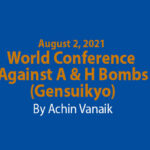In a Dangerous Time: Toward Preventing a Disastrous U.S.-China War
By Joseph Gerson (President, Campaign for Peace Disarmament and Common Security)
I want to thank Gensuikyo for inviting me to join today’s conference. It is an honor to share this digital stage with my friends and other movement leaders.
U.S.-Chinese relations are at their nadir. We are witnessing the restructuring of the global disorder into a new, dangerous, and totally unnecessary confrontation, analogous to the Cold War. As my colleague Zhu Zhiqun, wrote, “the Biden Administration has convinced itself that China is an existential threat to US national interests and…must be pushed back at all costs.” Trump, Biden, Blinken and others have forged a new national consensus: China is an existential threat to freedom and democracy; therefore the U.S. must aggressively defend democracy– militarily, diplomatically, technologically, and otherwise.
At root are the inevitable tensions between rising and declining powers that in the past have climaxed in catastrophic wars. There are also parallels to the years before WWI: those tensions between rising and declining powers, complex alliance structures, intense nationalism with its hatreds, territorial disputes, arms races with new technologies, international economic integration and competition, autocracies, and wild-card actors.
An incident, accident, or miscalculation could escalate to a major, potentially nuclear, war.
China’s economic transformation is the foundation for its aggressive diplomacy and increasingly advanced military. The deepening integration of Asian and Pacific economies with China’s, Beijing’s aggressive actions in the South China/West Philippine Sea, and its area denial air and cyber capabilities increasingly call into question Washington’s long-term ability to enforce its Indo-Pacific dominance.
Consistent with Trump’s 2018 National Defense Strategy, the Biden Administration has issued its Interim Strategic Guidelines focused on China as a “strategic competitor. Preparations for possible great power war against China or Russia remain the Pentagon’s and the ‘all government” priority. The Administration’s “get tough” approach to China was previewed in the confrontational run up to the Anchorage mini summit in March. June’s NATO summit’s adoption of its 2030 doctrine, makes containment of China one of the alliances two priorities. Beginning with the dispatch of an aircraft carrier fleet to the South China/West Philippine Sea within days of Biden’s inauguration, the administration has engaged in provocative military operations And Biden’s record high military budget spells danger as well as jobs and profits.
One change from the Trump era is Biden’s commitment to military alliances. Prime Minister Suga and President Moon were the first foreign heads of state invited by Biden to Washington. Secretaries Blinken and Austin met with their QUAD alliance partners before confronting their Chinese counterparts in Anchorage. A QUAD summit is scheduled for September. Biden has reaffirmed the U.S. “ironclad” commitment to its alliance with South Korea, its military backing to Japan’s Senkaku/Diaoyu Island claims, and to the military defense of Philippine interests in the South China/West Philippine Sea.
Taiwan is the Indo Pacific’s most dangerous flashpoint. Neither side wants war, but accidents and miscalculations happen. U.S. support for the island’s liberal democracy is a major source of tension with authoritarian China, but two geostrategic realities lie at the heart of great power tensions over the island. Taiwan is 100 miles from the Chinese mainland and is thus seen as a source of Chinese military vulnerability. Taiwan is also the world’s leading source of advanced semiconductors on which the U.S., Chinese and Japanese economies depend. These make the island a coveted strategic prize.
China has been clear about its red line in Taiwan. Despite Beijing’s preference for peaceful reunification with its ‘renegade province”, Beijing warns that if Taipei takes irreversible steps toward de jure independence, it will respond militarily.
Biden and Blinken are playing with fire. For the first time since renewal of U.S.-Chinese relations, Taiwan’s functional ambassador to the U.S. attended the presidential inauguration. Contrary to the one-China policy and to “strategic ambiguity” regarding defending Taiwan, Blinken and Austin have trumpeted Washington’s ”rock solid” commitment to Taiwan’s defense.
Biden has repeatedly dispatched warships to the Taiwan Strait. Guidelines that long restricted U.S. diplomats from meeting their Taiwanese counterparts are being revised to encourage such meetings. And discussions are proceeding for the deployment of a permanent U.S. naval presence near Taiwan.
China is no innocent. In addition to repressing human rights in Hong Kong, Xinjiang and elsewhere, the PLA welcomed the Biden Administration by repeatedly sending warplanes into Taiwan’s air space and its warships into Taiwanese waters. And Xi Jinping marked the Chinese Communist Party’s 100th anniversary by stressing the importance of “peaceful reunification” with Taiwan as a principle for China’s “national rejuvenation.”
The situation is no better in the South China/West Philippine Sea, where even the Pentagon recognizes that China’s military doctrine is “strategic defense.” Encircled by U.S. military bases and installations and the 7th Fleet, in total disregard of other nations’ legitimate claims and of international law, China has expanded its South China Sea defense perimeter with its neo-imperial nine-dash line and construction of military bases on disputed rocks and islets. This is in the imperial tradition of great powers.
The Sea holds the world’s fourth largest oil reserve plus massive amounts of natural gas, and other minerals. Of greater strategic importance, the Sea lies astride sea lanes over which 40% of the world’s trade transits, including fossil fuels that power the Chinese, Japanese and South Korean economies. Like the Persian Gulf in the 20th century, the Sea is the jugular vein of global capitalism. Were its sea lanes to be blockaded, the region’s economies would face disaster.
Add to this the Sea’s waves lap against China’s most vulnerable frontier – its coastal economic powerhouse.
To reinforce U.S. regional hegemony, Presidents Obama, Trump and now Biden have encouraged resistance to China’s South China Sea territorial claims and have conducted frequent and provocative “freedom of navigation,” naval and air shows of force near the disputed islands occupied by China. The 7th fleet is now joined by British, French, German, Dutch, and Japanese warships. China, too, has been conducting provocative naval drills, the most offensive being its deployment of more than 200 ships to block access to Whitsun Reef, within the Philippine’s Exclusive Economic Zone.
A new Cold War with China or, worse, a hot and potentially nuclear war, are the last things that humanity needs. Human survival demands overcoming vested interests and pursuing diplomatic solutions to stubborn and impacted disputes.
What would a nuclear weapons-free world be if there were no humans left to enjoy it? This means organizing to prevent great power, potentially nuclear, war. As we learned from the Palme Commission’s 1982 Common Security report, security cannot be achieved via spiraling arms races. It can only be achieved by creating mutual trust and pursuing mutually beneficial diplomacy. Common Security is not peace or nuclear weapons abolition, but it can prevent catastrophic war and open the way for nuclear disarmament, collaboration to reverse the climate emergency and addressing this and future pandemics.
Our demands should thus include:
- Credible U.S. and Chinese steps toward fulfilling their Article VI NPT obligation; U.S. adoption of a no first use nuclear war fighting doctrine, and renewed Chinese-U.S. military to military consultations.
- Ending ALL provocative military shows of force.
- Honoring the one-China formula and encouraging Chinese-Taiwanese negotiations
- Negotiation of a binding Southeast Asian Code of Conduct regarding operations in the South China/West Philippine Sea and joint development of the sea’s mineral resources.
- Nuclear umbrella states signing and ratifying the TPNW to put pressure on all the nuclear weapons states.
No more Hibakusha! No to nuclear weapons! No to War! And yes to justice, to a life sustaining climate and to people’s health!


